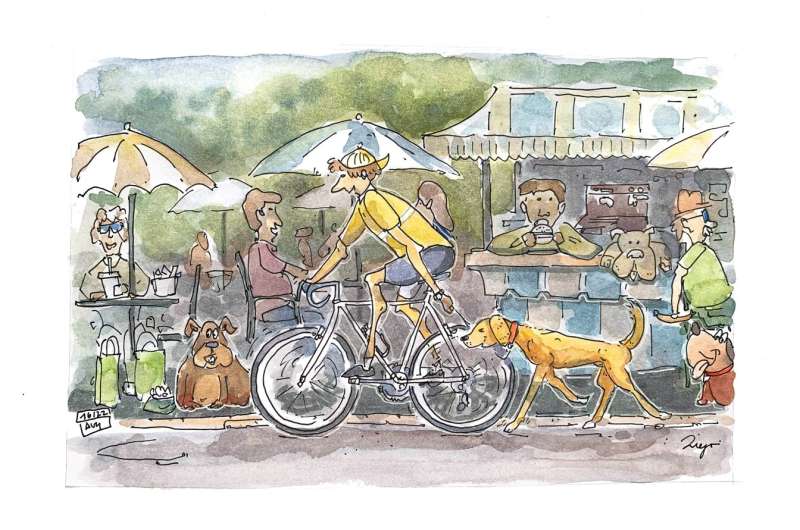Compared to inactive owners, active dog owners report exercising their dogs more and report their dogs’ weight as healthier. Credit: Diego Perez-Lopez, PLOS, CC-BY 4.0 (creativecommons.org/licenses/by/4.0/)
A new, international study suggests that dog owners who spend more time exercising themselves tend to exercise their dogs more, and more active owners are also more likely to perceive their dog's body weight as being ideal. Sydney Banton of the University of Guelph in Ontario, Canada, and colleagues present these findings in the open-access journal PLOS ONE on August 24, 2022.
Obese dogs may face a number of health problems, such as diabetes and cardiac disease, and concerns about dog obesity are increasing worldwide. Earlier research has identified associations between dogs' body weight and diet, exercise, and sociodemographic factors. However, those studies tended to be small and focused on individual countries.
For a broader, international perspective, Banton and colleagues analyzed results from a survey of 3,298 dog owners living in France, Germany, the United Kingdom, Canada and the United States. The survey included questions about both owners' and dogs' diet and exercise routines, and each owner's perception of their dog's body weight.
Analysis of the survey responses showed that dogs were more likely to get more exercise if their owners spent more time exercising themselves. More active owners were also more likely to perceive their dog as having an ideal body weight. Compared to owners in other countries, owners in Germany tended to exercise their dogs for a longer time, were more likely to perceive their dog's body weight as ideal, and were less likely to report having been told that their dog was overweight.
Among dogs who were 5 years old and older, owners were less likely to perceive their dog as having an ideal body weight if they had been told their dog was overweight, if they reported attempting to control their dog's weight by limiting food intake, and if they reported giving dogs other foods, such as treats, every day.
The findings suggest that many owners may attempt to control dogs' body weight through diet, but not through exercise. The researchers therefore call for veterinarians to be given more resources to help owners develop exercise routines to avoid weight gain in dogs.
Sydney Banton adds: "Results from the survey revealed that feeding practices play a main role in owner perception of their dog being overweight, while exercise practices play a main role in owner perception of their dog being an ideal weight. While many weight loss strategies for dogs focus on feeding, this data highlights the need to incorporate exercise into weight loss regimens."
More information: Jog with your dog: Dog owner exercise routines predict dog exercise routines and perception of ideal body weight, PLoS ONE (2022). DOI: 10.1371/journal.pone.0272299
Journal information: PLoS ONE
Provided by Public Library of Science























